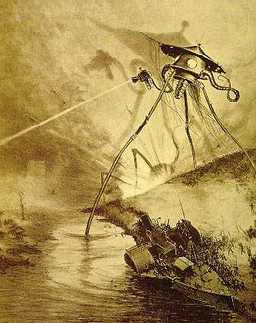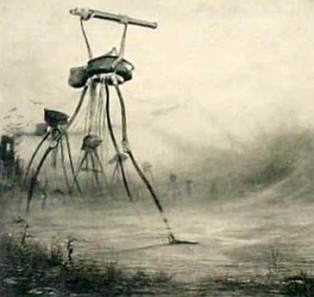Science Fiction developed really, really quickly as a genre. And I don’t think it’s a coincidence that it developed side-by-side with the growth of education and literacy in the West, in much the same way that I don’t think it’s a coincidence that the Doctor keeps accidentally landing his TARDIS in the vicinity of pretty women/Captain Jack Harkness/both. Stories that would once have been told with demons are instead told with aliens; stories about travelling through the air changed from magic carpets to spaceships; stories about racism, sexism, homophobia and other such societal ills could be openly and frankly discussed because they’re not happening to us any more, they’re happening to aliens in the future. You could argue that Science Fiction has always existed because mankind has always looked to the stars for inspiration (see also: the pyramids) but you could also argue that books have always existed because our ancestors used to write on cave walls with pictograms. You’re technically correct, but you’ve gotta draw a line somewhere and say “no, this is when we first started ruining our ecosystems to print more copies of Ye Olde Harry Potter”.
| The stories we tell are the ultimate reflection of the society around us. Many Crime Fiction aficionados speculate that Sherlock Holmes became such a hit because he came into being during the Jack the Ripper case in London, at a time when the city was growing out of control and more and more strangers were moving in every day. The Victorian readership needed a hero to cut through secrecy and tear down criminals, and lo, one appeared. Similarly in the 1800’s technology was accelerating to levels never before seen or experienced, and as a result - almost as a backlash - cautionary tales of fantastic technology gone horribly wrong also pulled themselves into being. |
The War of the Worlds must have seemed unprecedented to a Victorian. The year was 1897. It was the height of the British Empire. We owned everything. (Well, the upper classes owned everything, but unlike today the lower classes didn’t have Twitter to vent their frustration about this.) Great Britain stretched her mighty influences across the oceans - whether the receiving countries liked it or not - and we were genuinely thought of (mainly by ourselves) to be amazing at everything. America was a twinkle in the future’s eye, and World War One? Well, Europe’s been a bit rowdy at the moment, but we’ve signed all those alliances with everyone so we’ll be fine!
Ha ha ha.
Ah, hindsight.
Anyway, The War of the Worlds. Aliens land. People die. A lot of people die, from all classes, from all walks of life. Towns and cities lie in ruins. The proud Thunderchild, pinnacle of British engineering, is destroyed without a second glance. This is total war fourtyish years before World War Two and the detonation of the atomic bomb. Imagine how terrifying it would have been, reading about our country being destroyed by aliens (no, put the UKIP flier down, I’m still talking about HG Wells). Imagine all those people looking up at the night sky, inspired, imagining life up there - some of them for the first time. It would have been a truly breathtaking moment. We’ve all been used to the idea of aliens and spaceships since the 50’s - but the Victorians were not. They barely even had planes. It must have been an amazing feeling, experiencing something that new.
| And the great thing about The War of the Worlds? We didn’t win. In fact, we didn’t do anything. All our technology, all our prayers, all our ingenuity - it was all useless. Everything the British were proud of achieving simply fell down in the face of adversity; the aliens died from illness. (Granted, HG Wells did acknowledge that the various germs responsible for our victory had been put there by God, but the fact remains that humans were ultimately worthless when push came to shove.) HG Wells had been a student of a Darwin proponent, and in the first of many, many examples of real science inspiring science fiction had written a novel about technologically advanced creatures triumphing over their lesser counterparts. |
It’s a trend that continues to this day. Sometimes it’s successful (for example, the original The Day The Earth Stood Still) and other times it’s about as subtle as a brick to the face (Elysium, you are trying too hard). And this is what I meant when I said that all the best science fiction stories were written way back in the day, because their legacy still lives on through stories written yesterday, or tomorrow. You can’t get away from tradition, no matter how hard you try.
* I’m not making a fat joke here. Vicky’s underwear had a 52” waist. It was, truly, an enormous rear.
| Becca (Professer Lampenstien) Allen is a longtime youtuber and once co-hosted Back To The Eighties before creating looped smelting pool experience for her fellow podcasters. She has never been brought to justice for crimes against science. |




